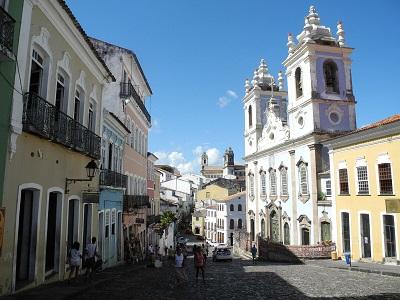Religion in Brazil: Candomble and Co

Afro-Brazilian traditions from Salvador da Bahia
If you are planning a vacation in Brazil, Salvador da Bahia should make a note. The first capital of Brazil, situated on a bay and surrounded by the tropical sea, fascinates by its breathtaking beauty, a cheerful attitude to life, and the multi-layered culture. Besides its history, Salvador also has an endlessly long bathing coast to offer. About 2.6 million people live in the city, which is strongly influenced by African traditions. This is reflected in the musical rhythms and the cuisine of Bahia, among other things. The special energy that characterizes Salvador is guaranteed to enchant visitors from all over the world.
The Afro-Brazilian roots are very present in Salvador due to the once lively slave trade between Africa and Brazil and still influence the lifestyle of the inhabitants today. Wild music and delicious food bear witness to this. In the "Pelourinho", the historic old town, the magnificent European baroque blends with the strong influences of African customs. Salvador da Bahia is a fascinating melting pot of cultures and religions. One example is the Candomble. It is an Afro-Brazilian religion that developed during the period of Portuguese colonialism, from the sixteenth to the nineteenth century, and is now practiced mainly in the state of Bahia.
Salvador is the center of Candomble, which has its origins in West Africa. African slaves from Angola and Nigeria brought their customs and beliefs to Brazil, where they developed further. A total of four orientations can be identified:
- Xango
- Batuque
- Macumba
- Candomble
The Portuguese colonial rulers considered these religions to be witchcraft and prohibited the practice of what they called "demonic". For this reason, the African slaves began to hide their faith behind Catholic rites and images to remain faithful to their religion in secret. Thus it turned out that aspects of Catholicism have been incorporated into today's Afro-Brazilian beliefs. Meanwhile, these religions are widespread in Brazil and have their rituals and temples. They are based on the belief in various "Orixas", which have a similar position to the Catholic saints and often merged with them during the time of the ban on Candomble. Each Orixa has its symbols, colors, and preferences, which are taken into account when giving gifts and offerings. The deities are composed of the four elements of nature: fire, water, air, and earth. These disembodied figures receive their physicality through their believers, whose bodies they take possession of during rituals. Through dance and music, the different characteristics of the respective Orixas are imitated and constantly repeated, so that the devotees put themselves into a trance-like state. During the trance, according to the belief, the saint penetrates the body. Candomble ceremonies can sometimes be observed both in Salvador and on the beach of Rio de Janeiro. The divinity Iemanja, for example, has such popularity among the Brazilian population that on New Year's Day thousands of people in Rio throw flowers and gifts into the sea.
Take yourself on an unforgettable Brazil trip to Salvador da Bahia, the capital of mysticism, magic, and spirituality.
Source: salvadorcentral.com

